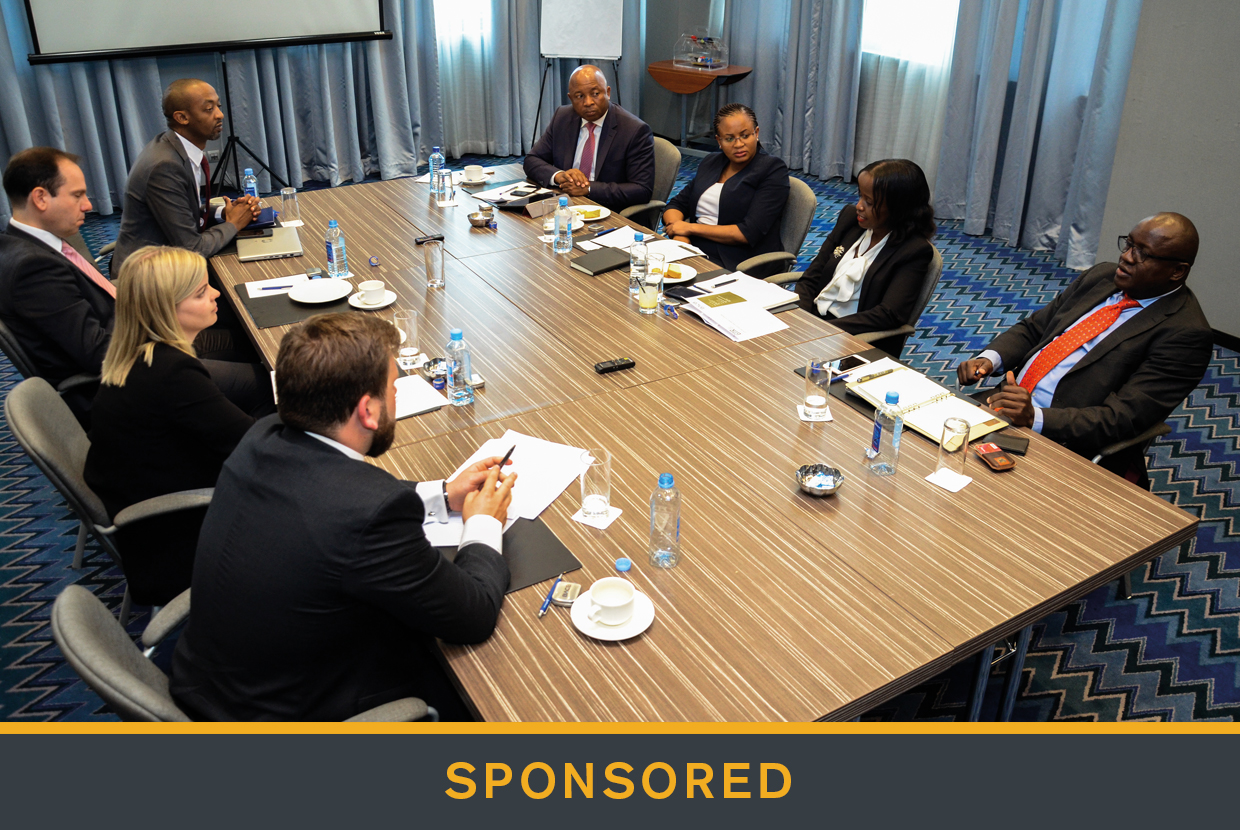The newly-ratified African Continental Free Trade Area and China’s growing influence in Africa are two themes followed closely by traders and financiers across the continent. On the sidelines of GTR East Africa 2019 in May, GTR and BACB gathered the region’s trade leaders to discuss how these changes are affecting their business, including new opportunities and challenges.
Roundtable participants
- Sanne Wass, senior reporter, Global Trade Review (GTR) (chair)
- Theo Osogo, director of business development, Sidian Bank
- Duarte Pedreira, head of trade finance, Crown Agents Bank; chairman of the Africa regional committee, the International Trade and Forfaiting Association (ITFA)
- Barnabas Kalenzi, head of international banking, Bank of Kigali
- Peter Hampson, associate director, BACB
- Joyce Kagiri, head of financial institutions, Co-operative Bank of Kenya
- Rennie Kariuki, underwriter, East Africa, African Trade Insurance Agency (ATI)
- Kudakwashe Matereke, regional chief operating officer, East Africa, African Export-Import Bank (Afreximbank)
GTR: Let’s start with the African Continental Free Trade Area (AfCFTA). In April, the Gambia became the 22nd nation to ratify the agreement, which is the number required for it to take effect. But the deal is still subject to negotiations around tariffs and rules of origin. Are you optimistic that AfCFTA will succeed, and what opportunities do you see for East Africa?
Matereke: AfCFTA was overdue. When you look at how difficult trade in Africa is, it calls for the approach that the African Union and other African institutions have taken to unify the continent. Some of our markets are as small as 2 million people. The markets are fragmented, reflecting the historical trade patterns of the colonial era, so it’s easier for somebody in Burundi to think of selling his goods to Belgium than to Kenya, for instance. It is easier for a South African buyer of leather to import from Italy, even though there is leather in Ethiopia or neighbouring Botswana.
AfCFTA calls for pushing towards harmonisation of terms so that we can create a local market amongst ourselves, without which our economies will not be successful. At Afreximbank we are optimistic that the creation of a larger market through AfCFTA will bring more long-term benefits.
There are five main items that are outstanding that will be dealt with as countries ratify the deal. They are the rules of origin, the schedule of tariff concessions and trading rules, the online monitoring and elimination of barriers, the digital payment and settlement platform, and then lastly the trade observatory portal, where people can exchange information online. It is important that the continent’s leaders have decided to move on with AfCFTA but these issues require a solution.
Hampson: We are also extremely optimistic. That is not to say it isn’t going to be a complex task. It has got to be a win-win situation for all stakeholders. And you have such a diverse number of stakeholders. You have very small, landlocked countries, very poor countries, and countries that are lower-middle income. Then you have the big economies of the continent, so there are a lot of people who need to be pleased. It will take hard work to get there, and it depends ultimately on political will.
Pedreira: This is about the creation of the largest free trade area in the world by number of countries. The combined GDP is about US$3tn. I hear you on the opportunity around leather exports from Ethiopia, but for me, the opportunities are all about value-add. If I look at Africa in the next few decades, I think it will see a massive shift in rebalancing from just commodities to value-added products. This is already happening.
For example, I have worked with a big electronics multinational, headquartered in Argentina, but which moved to Rwanda to fulfil the One Laptop per Child initiative. Instead of just importing the laptops from Argentina, it decided to set up an assembly plant in Rwanda. The company has now created an entire supply chain around that assembly plant. AfCFTA will allow Africa for the first time to aspire to retain that value-add. The interesting part will be when multinationals realise that to access Africa effectively, they need to bring production into Africa. That is going to be the revolution.
Kalenzi: I agree. We see a lot of opportunity in local value-added production because the commodities space is really unpredictable. There are loads of fluctuations and many countries export similar products. For us to be able to diversify, we need that value-add.
There are also other advantages that we are less focused on, especially in terms of free movement of labour and tourism. These are going to have a big impact on our economies, our trade balance and our inflation.
Kagiri: I am very optimistic about the integration. As a region, we are well positioned given that we already have export processing zones in East Africa. We enjoy good infrastructure. So AfCFTA is going to open the East African community to a larger market. Of course it comes with its fair share of challenges, which we acknowledge and have to work on, especially on the SME side. The two sectors that will benefit the most are manufacturing, which has probably exhausted the local markets, and then the SMEs, who are typically informal, so it will be up to the banking sector to see how we can support the SME segment in tapping into the new markets that will emerge.
Osogo: One of the key questions is, how do we treat the tariffs with which we operate within this particular region? Do we eliminate? Do we standardise? How do we go about it? It has always been a key challenge within the region.
There are those who believe they suffer significant losses when it comes to tariff review or tariff repricing. How are they compensated in the short and long term? There is also the issue of the distribution of costs, which is pretty uneven under the current tariff scenario.
Just down the road, maybe four or five kilometres from here, we have a leather market. It is very interesting to see that most of the traders who are buying leather are actually from Ethiopia. They buy it here, take it to Ethiopia, add value to it and bring it back so it can be used in the Kenyan market. Unless we manage to scale this up, we will continue to struggle.
Hampson: The UN Economic Council believes that having tariff-free access across Africa could grow intra-African trade by 50% within two years. It would also formalise a lot of that informal market. With or without a free trade area, cross-border trade happens, but much of it isn’t recorded or taxed.
But as you say, it comes with its concerns. One of the main reasons Nigeria did not initially sign up to AfCFTA is that it is concerned for its own domestic market.
Osogo: The problem is that within the respective jurisdictions, the focus is on the short term. If we focus on the long term and agree on the trade tariff issue, then there will be significant growth over time.
Kariuki: African countries need to move away from relying on rental income from international companies that are coming to extract our minerals. Nigeria has so much oil but has no fuel in its petrol stations. It doesn’t make sense. It was about time African countries came together. Intra-African trade is currently less than 10% of the continent’s trade, which is just not right. We’re supposed to enable each other to be self-reliant rather than relying on foreign investors to come in and extract minerals.
Also, having a common market means that we are able to increase competition domestically, which will motivate local businesses to produce better quality products at better prices.
GTR: A 2018 Moody’s report has pointed to the lack of trade finance as a barrier to reaching AfCFTA’s full potential. Is this going to be a challenge? And how are you addressing it?
Kalenzi: For local banks that are used to very simple trade finance systems, we now have to rely more on the knowledge transfer from international banks like Crown Agents Bank or BACB, to be able to serve the growing needs and be able to mitigate risk, especially when it comes to SMEs. There is an increasing need to make partnerships regionally and internationally, which we have been doing.
Also, in a bid to finance SMEs that are playing regionally, banks have had to take on collateral management. This was not the case five years ago. This of course now creates demand for good collateral managers that are reputable, so that risk is mitigated across the board.
Kariuki: We are preparing ourselves to support the AfCFTA, because we were established by the African Union to promote trade and investment in other countries. In the case of trade finance transactions across the countries, we will support local banks against non-payment by their borrowers. And for traders we also provide insurance against non-payment by buyers once they sell cross-border. We have increased our capacity to support the African countries to trade among themselves.
Matereke: It is very easy for us to make conclusions on a statement like that from Moody’s. One could also pose the question, is the availability of trade finance more difficult when the economies are closed?
Say you open up your economy, improve your capabilities in terms of what you produce and export, and there’s free movement of capital. If somebody makes an investment into something which they can export because the economies are open, would it be easier to finance? The answer to a banker would be, if you are making phones only for the 12 million population of Rwanda and you have a regime around exports and how you sell to other countries, it would be more difficult to finance.
It should be looked at in that context. If the economies open up and you trade goods that are of export quality to markets where a vendor will want to domicile the receivables from that market to repay a loan, there will be ease of access to financing because the lender can see his way through the cashflows for purposes of loan repayment.
Trade finance may be a challenge, but our challenges are more than that. This includes access to information and standardisation of our products so that people can be sure that if you buy quality tea, it is what it says it is. We are trying to address those issues so that traders and banks can trade more openly.
Hampson: As those tariff barriers come down and as partners get more used to trading with each other, the nature of intra-Africa trade finance will naturally shift. It’s likely that we will see a shift away from companies trading under letters of credit towards open account trading with discounting of receivables. There’s still a role for us, the international banks, to play: providing credit for the local banks and working in partnership to help that development happen.
Kagiri: What we have seen, especially in this region, is a deterioration in asset quality, especially for the manufacturers. The reason is mainly the threat of cheaper imports that are coming from China. If African markets open up and there are more opportunities, then banks would also be able to advance more trade finance facilities.
Pedreira: Let’s talk about the elephant in the room. There is an FX situation here, because how many local currencies do we have in African markets? That’s something that we together – local banks, international banks involved in Africa and multilaterals like Afreximbank – need to start thinking about. How are we going to gear up if all of a sudden a Rwandan bank has this receivable based in South African rand and his local currency is the Rwandan franc?
In my view, to start thinking about a one-currency solution is just importing someone else’s idea. Let’s not do that. I think we can create a settlement system within Africa that is well-equipped with liquidity providers from all the countries and that will eventually remove the requirement for us to be going to dollars and euros every time we need to settle trades amongst us. That is an important challenge.
Matereke: When you talk of barriers to AfCFTA, currency is one of the issues. Afreximbank has an initiative to create a payment and settlement platform. What we are championing is a system where, if for instance someone in Kenya is trading and the balance favours Kenya, you settle it at that level. Every quarter you settle in the agreed currency, which reduces the need for people to travel across the borders with currency of the other country. The Pan-African Payment and Settlement Platform is being supported by the African Union and the intention is that it can be launched at the regional economy grouping levels until it is scaled up to the continental level.
Hampson: You are right in that FX and trade finance generally go hand in hand. At the moment, you have Kenyan manufacturers who are buying their goods and paying their staff in Kenyan shillings, exporting to Uganda, who are buying the goods and then selling them in Ugandan shillings, but they’re doing the deal in US dollars. If there was a technology platform available for those corporates to settle in the respective currencies, it takes away their FX risk. And if you could build that in with a trade finance solution as well, it would help their cashflow situation.
Osogo: There was the regional payment system that was launched two and a half years back. It is a very good system, but the usage has not been as expected. I have been fortunate to work in a country like South Sudan where initially there are more dollars than the local currency. People didn’t understand it until they had no foreign currency and they had significant local currency, so they ended up devaluing their currency by 3,000% to date. What then happens is that things stop being competitive within that particular state and the benefit is not passed on to the people. So we still have a lot to do to create trust in payment systems. The mobile payment systems have worked well. Sending money to Uganda today is simple, and one of the local Rwandan banks is working to come up with another payment system that should be able to open up the borders.
GTR: Let’s move on to talk about the influence of China in East Africa. How has growing Chinese involvement in the region impacted your business?
Kariuki: We’ve seen increased business with the upswing in Chinese investments in Africa. We are not very sure what the Chinese are up to, not many countries are, but we have seen an increase in business, particularly when it comes to infrastructure projects where Chinese companies are participating. We are happy to support most Chinese companies as long as they have a good track record and the Chinese government is backing them.
Hampson: There are certainly a lot of positives with the Belt and Road Initiative. We are seeing infrastructure projects happening here that possibly wouldn’t have happened without it. Things like the standard gauge railway project, the Isimba hydropower station in Uganda, the dry ports that are being built, the projects in Djibouti. We are seeing inflows not just through East Africa, but we work in Dubai, India, Pakistan, Bangladesh and other parts of the Belt and Road Initiative. Where we can fit in and help with that trade flow, we are certainly seeing big increases in business.
But it comes with a cost. There has been some criticism that a lot of the projects have been done using imported labour and equipment, so there hasn’t been a transfer of skills to local people. But now that this infrastructure is being put in, it is up to Africa and the international banks to help make sure that it really rewards the region. It’s crucial to maintain the intra-Africa trade and boost that. Infrastructure is not necessarily a two-way street. What we don’t want to see is a massive increase in imports coming through that infrastructure. We want to see a proper two-way flow of trade.
Osogo: Chinese investments are bringing opportunities. Needless to say, Chinese companies do carry an advantage when they come into this market. One is funding. Their cost of funds is significantly lower than if I would support a local contractor. Secondly, the ease with which they get their funding and the strings attached are not as sophisticated as we require locally. What we’ve done from our end is to try and partner with the Chinese. We have many of them who are doing significant projects here which they must syndicate, so they syndicate with a local contractor and that has played a key role in helping us grow our business.
The Chinese are here to stay. So the quicker we see how to work around it, the better. As a bank, we have significantly supported local investors in infrastructure who have partnered with Chinese banks and Chinese companies to do projects here and we intend to continue with that.
Pedreira: You’ve hit the nail on the head. Some of you may know I set up one of the international banks in Angola. We were one of the very first banks on the continent to set up a China desk. I saw entire cities being built from zero by the Chinese infrastructure programmes. I once got involved with a large uranium project in Namibia. It came fully financed by the Chinese banks. What was left on the table for the local bank? There was a little bit of transactional business. But even banks with China desks risk losing the transactional business, because the Chinese banks are opening in each one of the financial centres.
What I also see at Crown Agents Bank, because we are fortunate to bank some of the central banks in Africa, is that debt repayments to China, be it monthly or quarterly instalments, have skyrocketed. Some of these sovereigns contracted these loans during the good days. Some of them were even indexed to commodity prices. Then the situation changed, and the countries found themselves with quite a bit more debt than they would have found palatable before. So yes, the development is important, the infrastructure is much needed, but it comes with a cost.
Kagiri: You really can’t fight the Chinese now; they are here to stay. So we look to align ourselves to benefit from their involvement in this region. One, on the payments space we have seen huge growth: most of the trade payments are made to China, and we have seen an increase in the correspondent relationships with this region. We’ve seen ICBC acquire equity at Standard Bank, which has a large footprint within the African continent.
Additionally on trade, the difference we have seen is that most letters of credit to China do not require confirmation, which effectively reduces the importation costs.
It’s for us to start thinking about whether to open a rep office in Shanghai, for instance. What can we do to take advantage of the opportunities that are coming up? African banks have done
well with China desks but there is increased competition with the Chinese banks setting up their own offices within the continent.
Pedreira: In the past, when European or American institutions were funding Africa, it came with a number of covenants that then gave them the power to lead the way development happened in Africa. We all know where that ended.
With the Chinese, the critical point to me is not to repeat those same mistakes. And the jury is out, because in Angola, for example, I have seen huge mistakes being made, whereby loans were linked to the price of oil, it was nearly barter trade, and eventually when the oil price came down it was a big problem. It left the country without reserves to sell externally, and we all know where the balance of payments is at the moment. So we need to look at how these funding facilities are being managed. If a sovereign defaults on one of these loans to China, potentially the collateral is what the Chinese built. Do we really want the Chinese to own our ports, our airports, our roads?
Kalenzi: If I can focus on the impact on banks, one mentioned the cheap funding. Recently three local banks were issuing term sheets for a project and the Chinese institution came in and gave flat dollar funding, medium term. No one was anywhere close to this. This is just the beginning. Another example is the construction projects. Of course everyone knows the grants that are coming to governments in construction and infrastructure and will be executed by the Chinese businesses.
Meanwhile, on the side where the Chinese companies are bidding for projects that are not government funded, governments will ask them for local content and local guarantees. There you will see the counter-guarantees coming in. ICBC and China Construction Bank have made some very good fees off that. So all in all we still can’t see the net benefit.
Matereke: Some countries have done well in negotiating, others haven’t. African governments need to learn how to negotiate contracts. Some of it is because they lack capacity, but it could be outsourced to local financial institutions, who could become part of the trade missions and represent their side on the packaging of the funding.
I agree that some transactions have not gone particularly well, but it is too early to comment on the success of some of the contracts that have been negotiated well. The truth of the matter is that there is actually a lot of funding which was difficult for some countries to get. We think that there is merit in us negotiating properly and insisting on certain quality to be adhered to. But we should be very careful about what we accept.















